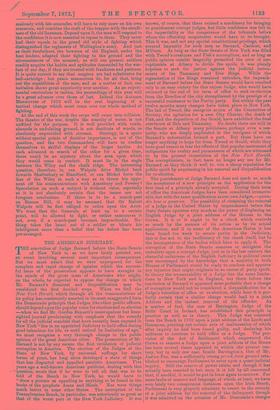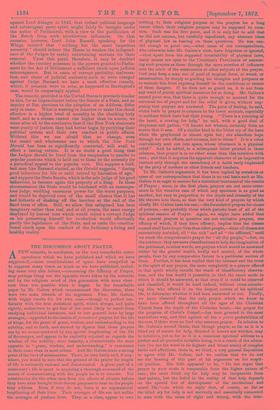THE AMERICAN JUDICIARY.
THE conviction of Judge Barnard before the State Senate of New York is, as we have lately pointed out, an event involving several most important consequences. But we must admit that we were unprepared for the complete and rapid change of opinion which the success- ful issue of the prosecution appears to have wrought in the minds of the great mass of Americans who might, on the whole, be expected to oppose the change to which Mr. Barnard's dismissal and disqualification may be considered the first decided steps. When we find the New York Herald, which through all the transmutations of its policy has consistently asserted in its most exaggerated form the Democratic principle that Judges, like other public officers, should depend upon the popular voice for election and re-election —when we find Mr. Gordon Bennett's unscrupulous but keen- sighted journal proclaiming with emphasis that the remedy for all the judicial scandals that have recently been exposed in New York "lies in an appointed Judiciary to hold office during good behaviour for life, or until retired by limitation of age," we must recognise a very thorough change in the public opinion of the great American cities. The prosecution of Mr. Barnard is not by any means the first revelation of judicial corruption in America. The election of the Judges of the State of New York, by universal suffrage for short terms of years, has long since developed a state of things that has disgusted and appalled patriotic Americans. Five years ago a well-known American publicist, dealing with this -question, wrote that if he were to tell all that was to be told of the Bench in New York, he would have to "draw a picture as appalling as anything to be found in the books of the prophets Amos and Micah." Nor were things much better in some other States. The corruption of the Pennsylvanian Bench, in particular, was notoriously as great as that of the worst part of the New York Judiciary. It was known, of course, that there existed a machinery for bringing to punishment corrupt judges, but little confidence was felt in the impartiality or the competence of the tribunals before whom the offending magistrates would have to be brought. This it was, and not any special constitutional privilege, which secured impunity for such men as Barnard, Cardozo, and M'Cunn. As long as the State Senate of New York was filled with Tweed's creatures and Fisk's accomplices, and as long as public opinion outside languidly permitted the crew of cor- ruptionists at Albany to divide the spoils, it was plainly hopeless to seek for justice against the judicial instru- ments of the Tammany and Erie Rings. While the organisation of the Rings remained unbroken, the impeach- ment of Barnard before the State Senate would have resulted only in an easy victory for this unjust Judge, who would have returned at the end of his term of office to seek re-election from the Rowdies of the city strengthened by the prestige of a successful resistance to the Purity party. But within the past twelve months many changes have taken place in New York. The fall of Tweed, the energetic action of the Committee of Seventy, the agitation for a new City Charter, the death of Fisk, and the deposition of Jay Gould, have exhibited the final overthrow of Erie and Tammany. No doubt there are still in the Senate at Albany many politicians, perhaps even a ma- jority, who are deeply implicated in the intrigues of which Barnard's subornation formed a part. But these have no longer anything to hope for from Tweed or Gould, while they have good reason to fear the effects of that popular movement of indignation the reality and permanence of which are witnessed to by the present recantation of the New York Herald. The corruptionists, in fact, have no longer any use for Mr. Barnard, so they think it well to win a cheap reputation for public spirit by acquiescing in his removal and disqualification for re-election.
The punishment of Judge Barnard does not mark so much the acceptance of a new principle as the application for the first time of a principle already accepted. During their term of office the American Judges have been considered irremove- able, but with the same qualification as our own Judges,—quant- diu bent se gesserint. The possibility of obtaining the removal of a judge in the United States by impeachment before the State Senate operates very much as the power of displacing an English Judge by a joint address of the Houses to the Crown. It is or it ought to be a check which controls as much by the menace of its action as by its actual application, and if in some of the American States it has been found too weak to secure purity in the Judiciary, this is due not to the inefficiency of the check itself, but to the incompetence of the bodies which have to apply it. The corruption of the State Senate removes or mitigates the restraints upon a corrupt Judge, just as in the last century the shameful unfairness of the English Judiciary in political cases was encouraged by the knowledge that a majority in both Houses of Parliament would be ready to condone and approve any injustice that might originate in an excess of party spirit. In theory the irremovability of a Judge has the same limita- tions in New York and in England, but there before the conviction of Barnard it appeared most probable that a charge of corruption would not be considered a disqualification for a Judge's retention of office or re-election, while here it is per- fectly certain that a similar charge would lead to a joint
Address and the instant removal of the offender. As a matter of fact, the case of Barrington, Judge of the Rolls' Court in Ireland, has established this principle in practice as well as in theory. This Judge was removed from the Bench in 1730 upon a joint address of the Lords and Commons, pointing out certain acts of malversation of which after inquiry he had been found guilty, and declaring his unfitness to continue to hold office as a Judge. The pro- vision of the Act of Settlement which empowered the Crown to remove a Judge upon a joint address of the House has been several times appealed to within the present cen-
tury, but in only one case, beside Barrington's, that of Mr. Justice Fox, was a sufficiently strong prima facie ground esta-
blished to encourage Parliament to enter upon a quasi-judicial inquiry. Still the reserve of power exists, and though it has actually been resorted to but once, it is felt by all concerned that, if needful, it would be put in force again to-morrow. For mere faults of manner and language, of which, at least, we have seen lately two conspicuous instances upon the Irish Bench, Parliament is very properly reluctant to resort to the remedy of a joint address for the removal of the delinquent, though it was admitted on the occasion of Mr. Duncombe's charges
against Lord Abinger in 1843, that violent political language and extravagant party spirit might fairly be brought under the notice of Parliament, with a view to the purification of the Bench from such mischievous influences. On that occasion, however, Lord John Russell, speaking for the Whigs, insisted that "nothing but the most imperious necessity" should induce the House to weaken the independ- ence of the Judges by rashly entertaining motions for their removal. Upon this point, therefore, it may be doubted whether the country possesses in the powers granted to Parlia- ment by the Act of Settlement a sufficient check upon judicial extravagances. But in cases of corrupt partiality, malversa- tion, and abuse of judicial authority such as were charged against Judge Barnard, we have a most effective remedy, which, if occasion were to arise, as happened in Barrington's case, would be unsparingly applied.
The remedy, provided in the United States is precisely similar to this, for an impeachment before the Senate of a State, and an inquiry at Bar, previous to the adoption of an Address, differ only in name. What is wanting in America to make this check effective is a higher level of morality in the checking body itself, and as a stream cannot rise higher than its source, we come after all to the conclusion that if the New York electorate want purity of justice, they had better begin by purifying their political system and their own conduct in public affairs. Without this we are afraid that no change, even the sound and wholesome one to which the New York Herald has been so significantly converted, will avail to effect a lasting reform. It is no doubt a good thing that the Judges should be freed from the temptation to pander to popular passions which is held out to them by the necessity for a periodical appeal to the popular vote. But suppose a bold, bud man like Barnard elected, as the Herald suggests, "during good behaviour for life or until retired by limitation of age," and suppose the State Senate, which is the sole judge of his good behaviour, to become again the property of &Ring. In these circumstances the State would be burdened with an unscrupu- lous judge, wielding enormous power for the wont purposes, and would be deprived even of the small chance that it has bed hitherto of shaking off the incubus at the end of the fixed term of office. Still, we allow, this safeguard has been imaginary rather than real, and at all events, the same energy displayed by honest men which would reject a corrupt Judge on his presenting himself for re-election would effectually purify the legislature of the State, and so make the constitu- tional check upon the conduct of the Judiciary a living and healthy reality



































 Previous page
Previous page